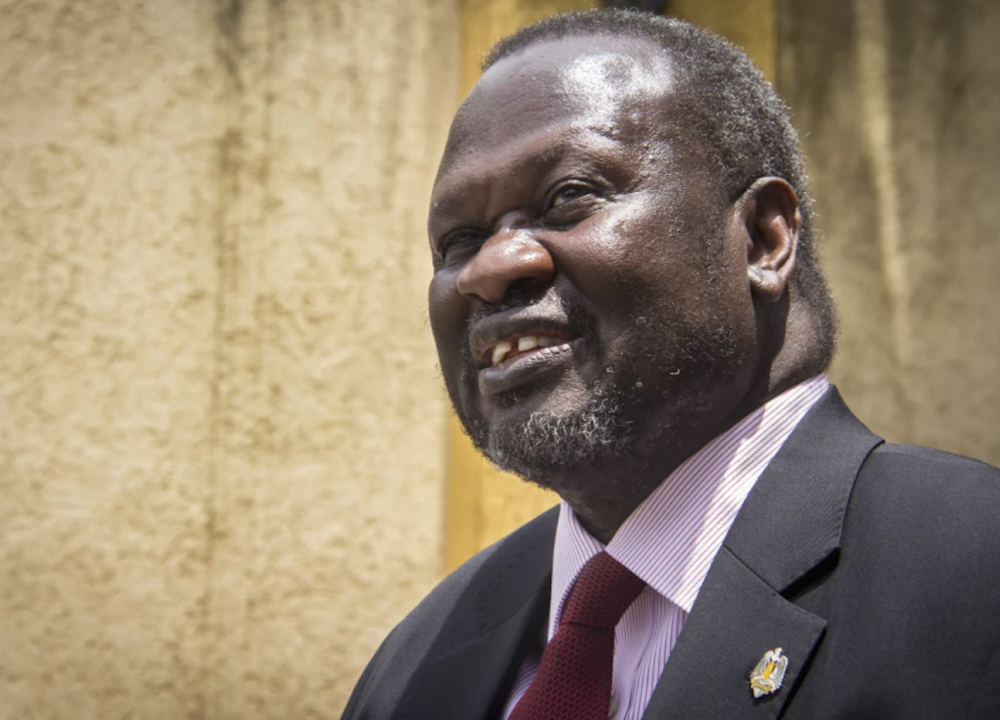South Sudan president suspends VP amid treason, murder charges
South Sudan’s Vice President Riek Machar has been charged with treason, murder, and crimes against humanity over a deadly militia attack in Nasir.
-

South Sudan's Riek Machar speaks to the media about the situation in South Sudan following a peace agreement the week before with the government in Ethiopia, on August 31, 2015. (AP)
South Sudan’s First Vice President, Riek Machar Teny, has been charged with treason, murder, and crimes against humanity over his alleged involvement in a deadly militia attack in the northeastern town of Nasir in March, according to the country’s justice minister.
Justice Minister Joseph Geng announced the charges during a press briefing on Thursday, stating that Machar was implicated in the March assault by the White Army, a local ethnic militia accused of targeting federal forces. Geng said evidence showed the group operated under the influence of leaders from the Sudan People's Liberation Movement/Army-in Opposition (SPLM/A-iO), including Machar.
“Evidence further reveals that the White Army operated under the command and influence of certain leaders of the SPLM/A-iO, including Dr. Riek Machar Teny,” Geng told reporters.
Suspension of vice president, petroleum minister
Just hours after the announcement, President Salva Kiir Mayardit suspended Machar from his role as first vice president. The decree, broadcast on state radio, did not offer further details but also included the suspension of Petroleum Minister Puot Kang Chol, who was charged alongside Machar.
Both Machar and Puot have been under house arrest since March, following the Nasir attack. In total, 21 individuals were indicted in the case, with Geng confirming that 13 suspects remain at large.
International concerns, rising tensions
The suspension and charges significantly heighten the long-standing political rift between Kiir and Machar, whose factions previously faced off in South Sudan’s 2013–2018 civil war, a conflict that left an estimated 400,000 people dead.
While the two leaders later formed a fragile unity government under the terms of a peace agreement, tensions have persisted. Sporadic violence and deep political mistrust continue to undermine the stability of the country.
International actors have repeatedly called for Machar’s release, warning that his detention could destabilize the already fragile peace process.
“While the government of the Republic of South Sudan appreciates the engagement of international partners, public and media on the Nasir incident, this matter is now sub judice,” Geng said, signaling that the case is now under judicial consideration.
Civil society calls for fair trial
Local civil society groups have expressed concern about the legal process. Edmund Yakani, Executive Director of the Community Empowerment for Progress Organization, urged transparency and judicial fairness.
“I hope the court trying Machar and the seven others will be a competent court of law, not a kangaroo court,” Yakani said in a public statement.
Broader implications for peace, governance
The developments mark a critical turning point in South Sudan’s political crisis, with fears that the legal action against Machar could fracture the fragile power-sharing structure and potentially reignite conflict.
The Nasir attack, combined with the growing political fallout, has underscored the ongoing instability in the post-conflict era and the challenges facing South Sudan’s path toward sustainable peace.

 3 Min Read
3 Min Read










